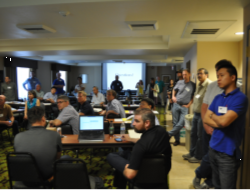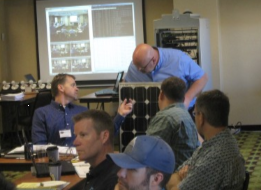Annual Forum for ITS Implementers Facilitates High-Quality Exchange of Technical Information
The Western States Rural Transportation Technology Implementers Forum is an annual engineering practitioner’s conference. Started in 2006, the Forum provides a unique opportunity for field engineers, maintenance personnel, and technicians to share ideas and discuss rural ITS implementation. The Forum encourages dynamic discussion at a technical level to promote transfer of solutions and knowledge across the ITS community. Over the years, topics have ranged from microwave communications to RWIS to complex software and data exchange with rural TMCs.
The Forum helps to develop a skilled workforce and promotes ITS deployment. It provides information about emerging technologies to implementers, encourages new deployments, and helps agencies make informed decisions. The Forum helps agencies deploy and maintain effective systems by providing direct technical assistance to implementers which enhances the overall transportation system. At its core, the Forum is a multi-state network of colleagues who turn to each other for assistance with ITS projects and deployments.
Researchers and developers of ITS technologies who present at the Forum learn first-hand what users want and need. Participants identify ideas for follow-up or spin-off research and meet engineers from other agencies with shared interests.
“The Forum is all about transparency and trust, getting the real story from the people who have actually done it – it’s about designs and deployments that have really been done – about what worked and what didn’t, about how systems work and what works well. If you are serious about doing Rural ITS, the Western States Forum is the only place you can interact with those who have made things happen.”
Ian Turnbull, Chief, Retired
Caltrans District 2, Office of ITS Engineering & Support
Forum Founder
Key attributes of the Forum include:
- Presentations are substantive, lasting between one to two hours.
 Presentations are developed and presented by those who conducted the project. They are about real implementations, not just ideas or glossy vendor sheets.
Presentations are developed and presented by those who conducted the project. They are about real implementations, not just ideas or glossy vendor sheets.- Speakers delve into the technical details of a project – how it was designed, engineered, integrated, and implemented. Presentations are practical and often include live demonstrations of deployed systems.
- Participants and speakers discuss not only what worked but also what didn’t work.
- The steering committee reviews at least two drafts of each presentation to ensure the Forum standards and expectations are met. This steering committee also guides the planning and coordination of the event.
- Attendance is capped to foster transparency and trust and spark discussion.
- Vendors are not invited. This allows for frank discussions related to current technology deployments.
- Questions and discussion are encouraged during presentations, not just briefly at the end.
- Extended breaks, equipment displays, and group meals provide quality networking opportunities.

The Forum started with a need for in-depth dialogue, technical information sharing, and practical discussions about implementations geared toward field engineers and technicians. After 13 events, the Forum has become the premiere venue for disseminating hands-on, nuts and bolts Rural ITS information to engineers, technicians and practitioners in the west. Participants have come from ten western states (Alaska, California, Idaho, Montana, Nevada, Oregon, Texas, Utah, Washington and Wyoming), the U.S. Department of Transportation (DOT), eight state DOTs, ten universities, multiple municipal transportation departments, the Idaho National Laboratory, the Southwest Research Institute, the California Highway Patrol, the California Department of Water Resources, all twelve Caltrans districts, and multiple offices and divisions within Caltrans.
Long-time participants attest to the value of the Forum:
“Attending eleven of the Forums has helped me in several ways. The most tangible would be our RWIS projects. They have been influenced by our interactions with Caltrans District 2, both at the Forums and by the working relationships that were fostered as a direct result of the Forums. I’ve also gleaned valuable information about hardware and design criteria for wireless communications and solar power – essential elements for rural ITS.
The Forums have helped build my technical knowledge but perhaps just as importantly, they have helped foster working relationships. The other help to me is to see that there are ITS practitioners that pioneer new ways to improve the state of the practice in spite of the obstacles.”
Phil Graham
Transportation Engineer Electrical
Caltrans District 9
Every year the Forum is evaluated in-depth to maintain quality and meet the expectations of the steering committee and participants. Here are several participant comments from Forum evaluations:
- “Once again I learned relevant information that I can take back to my department.”
- The detail was enough to be helpful if I have a need to implement a similar system.”
- “Great topics and presentations. Appreciated level of detail (not too extreme, but usefully specific).”
- “A lot [of] information presented in this forum can be used in transportation education to college students.”
- “Take time to further knowledge on topics shared, recruit others to do the same.”
- “This will let me be aware of tools to solve problems.”
- “Gave me better overall systems knowledge to perform my job better.”
- “Exposure to equipment brands/models that are available helps when deciding what equipment to purchase to solve a particular problem.”
To read more comments, please see http://www.westernstates.org/Impact/WSF/Default.html.
The concept for the Western States Forum originated through the rural California/Oregon Advanced Transportation Systems (COATS) partnership. The Forum is sponsored by the California Department of Transportation and the Western States Rural Transportation Consortium. Original Steering Committee members and founders of the Forum were:
- Ian Turnbull, Caltrans District 2
- Sean Campbell, Caltrans Division of Research, Innovation, and System Information
- Chris Strong, Western Transportation Institute
The current Steering Committee is:
- Sean Campbell, Caltrans Division of Research, Innovation, and System Information
- Jeremiah Pearce, Caltrans District 2
- Doug Galarus, Utah State University and the Western Transportation Institute at Montana State University
- Leann Koon, Western Transportation Institute at Montana State University
For more information about the Western States Forum or to review technical content and photos from past events, see the website at www.westernstatesforum.org or contact Leann Koon at leann.koon@montana.edu or (406) 994-7643.



Leave a Reply